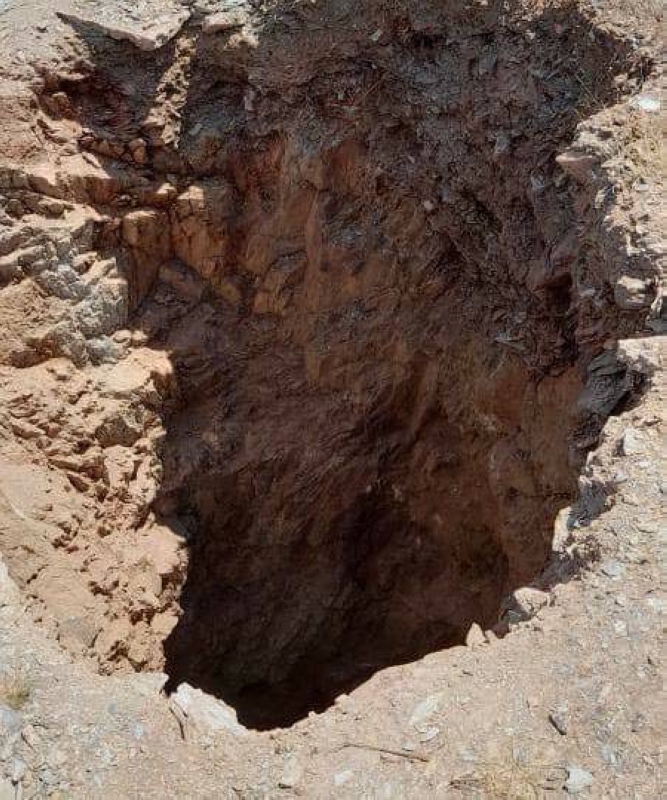Alleged gold miner appears in court
Lebogang Mosikare | Monday December 19, 2022 06:00


For example, in the beginning of October this year, members of the Botswana Defence Force (BDF), the Botswana Police Service (BPS), experts from the Department of Mines and fire fighters frantically launched a joint search to retrieve the body of a Zimbabwean who was alleged to have fallen into a 200-metre shaft at the old Rainbow Gold Mine.
The man is alleged to have fallen into the mine shaft on September 16 when he and others were on a mission to mine gold illegally. The shaft is one of those the Department of Mines closed last year following incidents of illegal gold mining.
Despite the inherent danger of illegally mining gold in old mine shafts in Botswana, the culprits, popularly known as Zama Zamas (‘those who strive’) in South Africa and Zimbabwe, continue to put their lives in danger.
Therefore, it came as no surprise after a 19-year-old man from Zimbabwe appeared in court before Magistrate Thapelo Buang for a single count of ‘mining gold illegally’.
According to the charge sheet, Keith Banda was allegedly found in possession of unwrought precious metals suspected to be gold at Tachila Farms on December 9. Banda also faces a single count of entering Botswana at an illegal point of entry at or near Ramokgwebana village during a date unknown to the prosecution.
He was not asked to plead for the alleged possession of gold - one of the world’s most precious metals. Giving reasons why the accused should be remanded in custody, prosecutor Kenneth Bokgakga from the Directorate of Public Prosecutions (DPP) said the matter was still fresh. Bokgakga added: “When the accused was arrested by the police, he did not produce any document authorising him to stay in Botswana. Preliminary investigations show that he is an illegal immigrant from Zimbabwe.
As such, we fear that if he is granted bail, he may escape and never appear in court again. Also, the unwrought precious metals that are suspected to be gold have been taken to geologists to ascertain their status.
Therefore, we pray that the accused be remanded in custody until investigations in these matters are complete.” Magistrate Buang then acceded to the application made by the prosecution and remanded Banda in custody until next year.
Towards the end of 2021 and beginning of this year, cases of people, mostly Zimbabweans, who were charged with unlawful prospecting for minerals without a permit or licence authorising them to do so were withdrawn because of lack of evidence. The withdrawal of the cases riled up the police who said after much effort and the resources they used to arrest the ‘illegal miners’, the cases ended up being withdrawn from the Francistown Magistrates’ Courts. The cases were withdrawn because soil testing machines that the Botswana Geoscience Institute (BGI) used to test the soil samples which were in possession of the accused at the time of their arrest were not working.
Prosecutors from the DPP also expressed displeasure about the status quo following the wasted time and resources they used in preparation to prosecute the cases.
In response to a questionnaire about the withdrawal of cases in February, BGI confirmed the status quo. BGI’s marketing and communications manager, James Molosankwe said: “We confirm that BGI is a parastatal under the Ministry of Mineral Resources, Green Technology and Energy Security. The Institute is mandated, among other things, to undertake research in the field of geosciences, which includes mineral assessments that may involve collaborating with other stakeholders such as the DPP.
Our work involves the use of high profile and specialised equipment and machinery, which are supported by Original Equipment Manufacturers (OEMs).” “Regrettably, the spares are not readily available as off the shelf items. Sourcing such repair spares has long lead times. The COVID-19 travel restrictions also affected delivery particularly in relation to cross-border travel of specialists to Botswana for installation and commissioning,” said Molosankwe. Molosankwe added: “We further inform you that the Institute has a plan to continue its laboratory tests in the form of having a complimentary testing machine on standby which also broke down unexpectedly.
These testing machines have now been repaired and we will continue to offer our services as authorised. We regret that this situation has affected the processing of court cases and was undeniably beyond our control.” The problem of illegal gold mining is not only confined to Botswana, Zimbabwe and South Africa. Earlier this year, the London Bullion Market Association (LBMA) estimated that there are 15 million artisanal and small-scale gold miners in the world, responsible for 15-20% of global annual gold production. It pointed out that while the sector plays an important role in local livelihoods, it is also associated with ‘social and political instability... and the lost economic promise borne by smuggling and the continued marginalisation of the sector.
“Artisanal and small-scale mining tends to be a hand-to-mouth enterprise with economic sustainability being achieved only further along the value chain by aggregators involved in buying, smelting and trading the yellow metal. Nowhere along the value chain are taxes and royalties consistently paid and much of the industry, in all countries, is in the hands of criminal networks,” according to LBMA.
